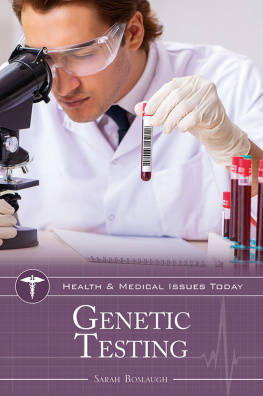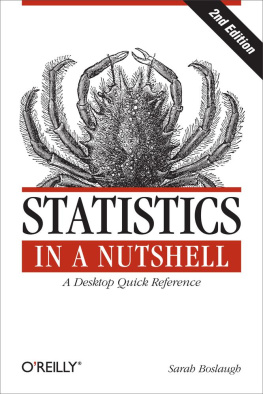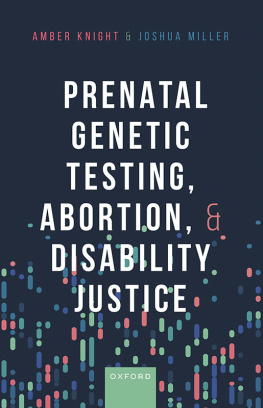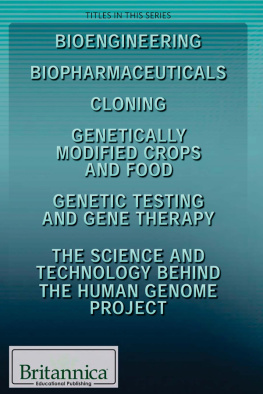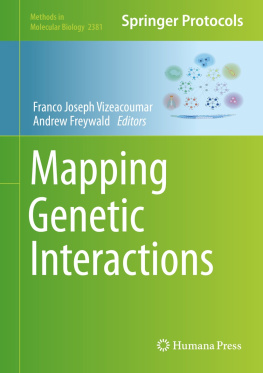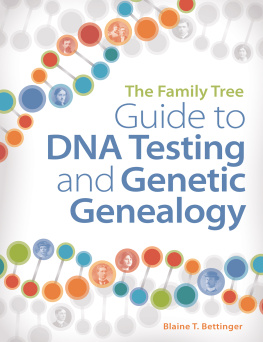GENETIC TESTING
Recent Titles in
Health and Medical Issues Today
Discrimination against the Mentally Ill
Monica A. Joseph
Concussions
William Paul Meehan III
Drug Resistance
Sarah E. Boslaugh
Work-Life Balance
Janice Arenofsky
The Body Size and Health Debate
Christine L. B. Selby
Obesity, Second Edition
Evelyn B. Kelly
Infertility Treatments
Janice Arenofsky
Assistive Technology for People with Disabilities
Denis K. Anson
Transgender Health Issues
Sarah Boslaugh
The Vaccine Debate
Tish Davidson
Stem Cells, Second Edition
Evelyn B. Kelly
Prescription Drug Ab use
Robert L. Bryant and Howard L. Forman
Universal Healthcare
Claudio Buttic
GENETIC TESTING
Sarah Boslaugh
Health and Medical Issues Today
Copyright 2020 by ABC-CLIO, LLC
All rights reserved. No part of this publication may be reproduced, stored in a retrieval system, or transmitted, in any form or by any means, electronic, mechanical, photocopying, recording, or otherwise, except for the inclusion of brief quotations in a review, without prior permission in writing from the publisher.
Library of Congress Cataloging in Publication Control Number: 2019047818
ISBN: 978-1-4408-6650-0 (print)
978-1-4408-6651-7 (ebook)
24 23 22 21 20 1 2 3 4 5
This book is also available as an eBook.
Greenwood
An Imprint of ABC-CLIO, LLC
ABC-CLIO, LLC
147 Castilian Drive
Santa Barbara, California 93117
www.abc-clio.com
This book is printed on acid-free paper 
Manufactured in the United States of America
Contents
Every day, the public is bombarded with information on developments in medicine and health care. Whether it is on the latest techniques in treatment or research, or on concerns over public health threats, this information directly affects the lives of people more than almost any other issue. Although there are many sources for understanding these topicsfrom websites and blogs to newspapers and magazinesstudents and ordinary citizens often need one resource that makes sense of the complex health and medical issues affecting their daily lives.
The Health and Medical Issues Today series provides just such a one-stop resource for obtaining a solid overview of the most controversial areas of health care in the 21st century. Each volume addresses one topic and provides a balanced summary of what is known. These volumes provide an excellent first step for students and lay people interested in understanding how health care works in our society today.
Each volume is broken into several parts to provide readers and researchers with easy access to the information they need:
- provides overview chapters on background information including chapters on such areas as the historical, scientific, medical, social, and legal issues involvedthat a citizen needs to intelligently understand the topic.
- provides capsule examinations of the most heated contemporary issues and debates and analyzes in a balanced manner the viewpoints held by various advocates in the debates.
- provides case studies that show examples of the concepts discussed in the previous parts.
A selection of reference material, such as a timeline of important events, a directory of organizations, and a bibliography, serve as the best next step in learning about the topic at hand.
The Health and Medical Issues Today series strives to provide readers with all the information needed to begin making sense of some of the most important debates going on in the world today. The series includes volumes on such topics as stem cell research, obesity, gene therapy, alternative medicine, organ transplantation, mental health, and more.
Human interest in heredity predates modern scientific understanding of genetics. For instance, speculation as to why children do (or sometimes don't) resemble their parents may be as old as humanity, and the practice of deliberately breeding plants or animals in order to produce desired characteristics was common long before anyone knew the process by which characteristics were passed from parent to child. Efforts to study the relationship between heredity and illness, such as the use of family histories to study patterns of disease among people who were closely related, also predate modern knowledge of genetics. Specific lab tests for genetic and chromosomal diseases started to appear in the mid-20th century, such as the newborn blood test for PKU (phenylketonuria). In the 1970s, lab tests were developed to identify the genetic characteristics associated with Tay-Sachs disease and sickle cell anemia. Today thousands of lab tests are available for different diseases and conditions, and tests are also available to identify some mutations that affect how individual patients may react to certain medicines.
While genetic testing is an important tool of modern medicine, the sheer number of tests available can seem overwhelming. While Genetic Testing is not meant to replace professional medical or genetic advice, it does explain the fundamentals of genetics in layman's terms and discusses many of the most common tests and conditions for which tests are available. Need for this kind of guide has increased with the advent of direct-to-consumer (DTC) companies that allow people to order genetic testing outside the context of medical care. This need is particularly great in the United States, where DTC companies are allowed to test for genetic characteristics associated with serious medical conditions such as breast cancer and Alzheimer disease, delivering the results directly to the individual tested. These issues are thoroughly discussed in Genetic Testing , as are the ethical and practical issues that may arise when genetic testing is performed outside the context of medicine.
Many people today also use genetic testing, typically ordered through DTC companies, to learn more about their ancestry. Few people ordering these services realize, however, how such testing is actually performed or the limitations of any conclusions that may be drawn from them. Genetic Testing explains (in general terms, because each DTC company uses its own proprietary methods) how genetic testing for ancestry is performed and highlights some of the controversies surrounding this type of testing. For instance, individuals who have sent identical samples to multiple companies have received differing reports about their ethnic heritage, and the pool of comparison samples for nonwhite individuals can be surprisingly small (and thus test results potentially less accurate than those for persons of European ancestry).
The increasing use of genetic testing in medicine raises many ethical issues. For instance, who should pay for it? Should insurers or employers be allowed to discriminate against people whose genetic makeup may predispose them to develop expensive or debilitating diseases? The rapid increase of knowledge in medical genetics also raises a host of questionsfor instance, if a new mutation is discovered that is associated with disease, who, if anyone, is responsible to notifying people who have that mutation, even if they were tested years prior to the identification of the mutation? Nonmedical uses of genetic testing also raise ethical issues: for instance, does the state have the right to demand a DNA sample from someone who is arrested but then released without charges, and should that individual's DNA be included in a database to be matched against evidence related to other crimes? These and many other issues are discussed in Genetic Testing , which offers an unbiased look at some ethical dilemmas related to genetic testing. Finally, the human impact of genetic testing is explored in five case studies that look at issues related to genetic testing and so-called cancer clusters, paternity testing, premarital genetic testing for individuals from high-risk groups, the reliability of information provided by DTC heritage testing services, and screening and diagnostic testing for Down syndrome.

